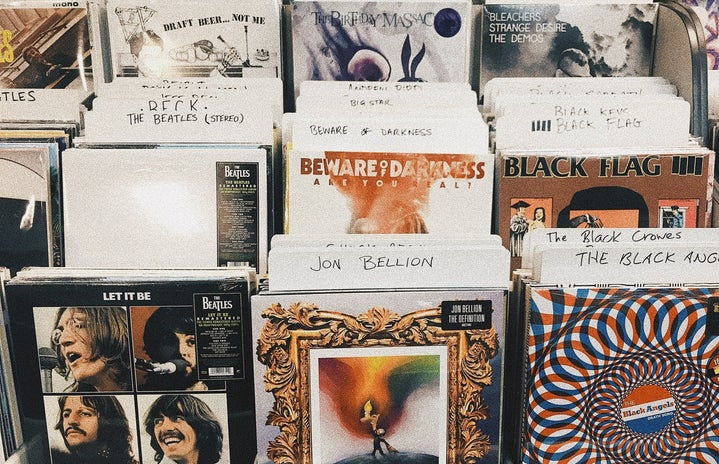Music undeniably shapes our identity and forms the soundtrack to important events in our lives. Certain songs have the powerful ability to transport you to a distant moment in time, painting the different shades of a memory, beloved or sad. The associations that we can garner to certain songs can make listening to them a cathartic process, purging our negative emotions in order to help process them. I have always formed strong attachments to music to help me cope with the weight of my emotions in difficult circumstances. The relatability and meaning conjured from music is universal, and I have a multitude of musicians to thank for the service that their songs have done for me. Below are four albums that have shaped me as a person, influencing the life choices I have made and the socio-political lens I view the world through.
Hozier, Hozier
Favourite songs:
- Work Song
- Like Real People Do
- Cherry Wine
Hozier’s style of songwriting is uniquely intimate and encompasses an open love of femininity, folklore, and literature. I first started listening to his music when I was 16, and was quickly drawn into it because of the way he wrote about women and sexual desire. Prior to listening to his songs, I had never heard a male artist affording so much respect and dignity to his female subjects. In an era of pop music where male artists objectifying women over a catchy beat was the norm, Hozier’s music was an important reminder that it didn’t have to be. His debut, self-titled, album introduced me to songs that showed male yearning and devotion towards the female subject, rather than entitlement and the threat of violence upon rejection. Songs like Work Song and Like Real People Do, helped to show my young self that you do not have to settle for less in love, and that your body is not the most important feature of your person. If Hozier can write such incredibly beautiful lyrics about being in love with a woman, then it is not unreasonable for that love to exist in ‘real life’. His songwriting became such a huge influence on me in my younger years that he ended up being one of the reasons that I decided to pursue a degree in English Literature. I knew that obsessing over the words in his songs was probably a sign that words and the study of literature had a greater meaning to me. Since his debut album, he has continued to produce breathtaking lyrics that do not compromise on their depiction of female characters, and continues to use classical and religious allusions to express love and devotion. His most recent album even chooses Dante’s Inferno as the inspiration for the overarching narrative – as if English students didn’t need any more reason to love him.
Seventeen Going Under, Sam Fender
Favourite songs:
- Seventeen Going Under
- The Dying Light
- Paradigms
This album came out in my second year of undergrad, and it marked a transition in my music taste. Sam Fender reignited my interest in guitar riffs and openly political, meaningful lyrics. The way in which he writes about class struggles and the variety of socio-economic issues affecting his hometown was very impactful to the way I construed my sense of self at university. University can be an incredibly difficult time for feeling like you don’t fit in; the environment I found myself in at university could not have been more different to my hometown, and it made me feel ashamed of where I came from. The people I was surrounded by, particularly in my second year of university, came from wealthier backgrounds and lived in nicer areas than me. Group conversations felt isolating because I could not relate to skiing trips and second houses, but listening to Sam Fender’s music helped to change the way that I viewed myself and my background. I’m from an area of North-West London that is simultaneously made up of beautiful suburbs and famous schools, but also grey, deteriorating tower blocks, and a wealth of socio-economic issues. Sam Fender’s depiction of North Shields, Newcastle, and the people there helped me to realise that there is beauty in your roots and that you do not have to diminish your identity to make way for others. His music also centres heavily around mental health struggles, particularly in young men and the fatal consequences of toxic masculinity. I had never previously heard a musician talk so openly and impactfully about mental health before and so grew to appreciate his genuineness and relatability even more. The special thing about Sam Fender’s music is its universality, the issues he describes are felt all across the world, and so his songs are able to touch a spot in people’s hearts that other songs simply can’t. I eagerly await his next album to hear what he writes about next.
Folklore, Taylor Swift
Favourite songs:
- This is me trying
- My tears ricochet
- Illicit affairs
Folklore is the album that got me into Taylor Swift. Before that, I was unfortunately part of the crowd that disregarded her music as very catchy, but surface level pop songs. Folklore is, in my opinion, her best songwriting, touching on themes of betrayal, loneliness and despair, and talking in a much more honest way than previous works about her mental health. I first listened to Folklore at the beginning of my third year of university and I found it incredibly relatable to things I was experiencing in my personal life. It provided me with a greater understanding of my emotions and gave me a great sense of solace. One of the beauties of good songwriting is that it can make you feel that you are not alone in what you are going through, because if an internationally successful popstar like Taylor Swift is writing about these issues, then it must mean that other people are feeling these emotions too. Folklore was also particularly impactful for me because it was despair and loneliness written from a female perspective, and as much as brilliant songwriting from male artists can be intensely comforting, it hits much harder when there is that extra layer of relatability. To Taylor Swift, I will always be grateful for writing the album that served as a soundtrack to my final year of undergrad, and for making me feel a little less alone in my struggles.
Stick Season, Noah Kahan
Favourite songs:
- The View Between Villages
- Growing Sideways
- Orange Juice
Stick Season came out in the beginning of my third year of uni and, similar to Folklore, provided a soundtrack to the emotions I was feeling. Kahan writes masterfully about the simultaneous isolation and community that is sourced from being in your hometown, and the mental health struggles he faces on a day to day basis. He talks frankly about therapy and medication in a way that is so genuine and refreshing that it makes these methods of help destigmatising for the listener. I cannot communicate how much of an impact Noah Kahan’s lyrics have had on my view of the world, and how much of a comfort his vulnerable songwriting has been to me and the community of listeners across the globe he has garnered. Stick Season came into my life at a time where I was having to face the fact that I would be returning to London, perhaps never to return to the city that had been my home for those pivotal undergraduate years. Songs like The View Between Villages helped me to begin processing my impending departure, and instead of feeling sad about leaving, to memorialise the experiences I had and people I met. Returning to York will never be the same as it was when I lived there, but having the associations of my life there preserved in Stick Season helps me to reflect and move forward with this new period of my life and feel grateful.
The impact of music on our worldviews and emotions cannot be understated. In every significant life event, you can recall the music you were listening to at the time, and the way that it impacted how you processed and responded to those circumstances. In every mundane, repetitive action you undertake, music makes that task better, more bearable. Your commute to uni, doing laundry, going on a run, the list goes on and on. There will most likely be albums in your life that have redefined your worldview and shaped part of your identity. Perhaps some of our albums will overlap. I encourage you to think about what those albums are, and what songs have impacted your life in ways beyond what you could have imagined – and be grateful that even in the bad and ugly moments of living, those songs were there along for the ride with you.
MENTAL HEALTH: If you or someone you know is seeking help for mental health concerns, visit Mind’s website https://www.mind.org.uk/ to access mental health resources. If you would like to talk to someone, or need crisis support, contact Samaritans for free by calling 116123 or emailing jo@samaritans.org.


